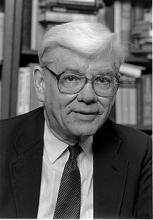Jaroslav Pelikan was born in Akron, Ohio, on 17 December 1923. His father and grandfather were both Slovak Lutheran pastors, and he himself was a member of the Lutheran Church until 1998, when he and his wife Sylvia were received into the Orthodox Church. He was educated at Concordia Seminary in St Louis before earning his PhD from the University of Chicago in 1946.
He taught at Valparaiso University from 1946 to 1949, Concordia Theological Seminary from 1949 to 1953, and the University of Chicago from 1953 to 1962. In 1962 he took up the post of Titus Street Professor of Ecclesiastical History at Yale University. He was appointed Sterling Professor of History at Yale in 1972 and remained until1996. Following his retirement from Yale, he also held chairs at Boston University and the University of Pennsylvania’s Annenberg School for Communication. Pelikan had close contact with the Library of Congress, where, in addition to being honoured with the 2004 John W. Kluge Prize for Lifetime Achievement in the Human Sciences, he was also the first person to hold the Kluge Chair for Countries and Societies of the North, and the founding chairman for the Council of Scholars. He also received the Jefferson Award of the National Endowment for the Humanities in 1983, and served on the President’s Committee on the Arts and Humanities under Bill Clinton. He gave the 1992–1993 Gifford Lectures at the University of Aberdeen.
He died on 13 May 2006 at his home in Connecticut.
His publications include: The Riddle of Roman Catholicism (1959); The Light of the World: A Basic Image in Early Christian Thought (1962); Christian Tradition: A History of the Development of Doctrine (5 vols., 1971–1989); The Vindication of Tradition (1984); Jesus through the Centuries: His Place in the History of Culture (1985); Bach among the Theologians (1986); Imago Dei: The Byzantine Apologia for Icons (1990); Eternal Feminines: Three Theological Allegories in Dante’s “Paradiso” (1990); The Idea of the University: A Reexamination (1992); Christianity and Classical Culture: The Metamorphosis of Natural Theology in the Christian Encounter with Hellenism (1993); Faust the Theologian (1995); What Has Athens to Do with Jerusalem? “Timaeus” and “Genesis” in Counterpoint (1997); Divine Rhetoric: The Sermon on the Mount as Message and Model in Augustine, Chrysostom, and Luther (2001); Credo: Historical and Theological Introduction to Creeds and Confessions of Faith in the Christian Tradition (2003); and Interpreting the Bible and the Constitution (2004).



